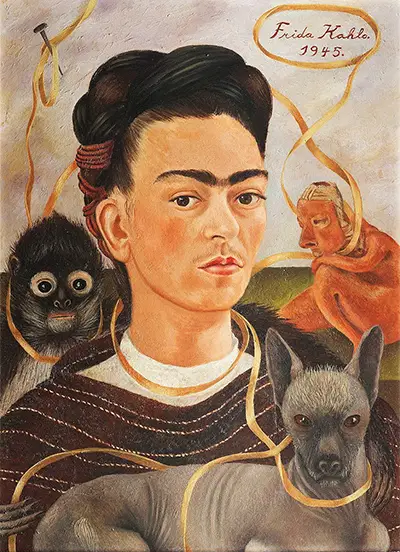The artwork was created in 1945 by the very patriotic Mexican female artist, Frida Kahlo de Rivera (1907-1954), who was mostly inspired by her country's popular culture and employed a naïve folk art style. The picture now hangs in Museo Dolores Olmedo, an art museum in Mexico City, the capital of Mexico. It was purchased by the eponymous Mexican businesswoman, in 1955, for her collection on which the museum is based and from which it is named.
This deeply symbolic work depicts Frida in three-quarter profile and her common themes of indigenous politics and religious beliefs are subtly apparent. In particular, her interest in the cyclical connections between the human and natural worlds. This is highlighted by the meandering, vine-like, yellow ribbon that intertwines Frida with her pet spider monkey, her Mexican hairless dog (Señor Xoloti) and, to her left, with a pre-Columbian/pre-Hispanic native idol artefact. The ribbon emanates from a circle enclosing Frida's signature and culminates by winding itself around a nail embedded into the beige clouds providing the background to the painting.
As is often the case in the genre of her many self-portraits, Frida surrounds herself with her favourite pets (perhaps because she was childless). Her dress and signature hairstyle, with a pink ribbon delicately tied into her long locks, are reminiscent of those of the women of South Eastern Mexico. Moreover, the bond is reinforced by the monkey, to Frida's right, that has his long arms wrapped around her shoulders. In addition, the brushwork used in her own tresses is echoed in that of the hair of her two dear animal friends. The three protagonists stare piercingly at the viewer as if to question him/her with the serious issues then confronting her post-colonial nation.
She was once quoted as saying, "I paint self-portraits because I am so often alone; because I am the person I know the best." In a letter to Antonio Rodriguez in 1952, Frida Kahlo displays her patriotic fervour, when writing, "I wish to be worthy, with my paintings, of the people to whom I belong and to the ideas which strengthen me."

